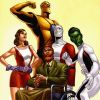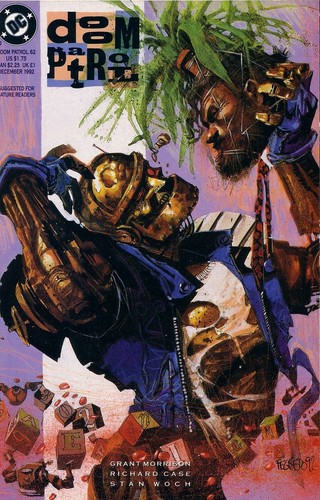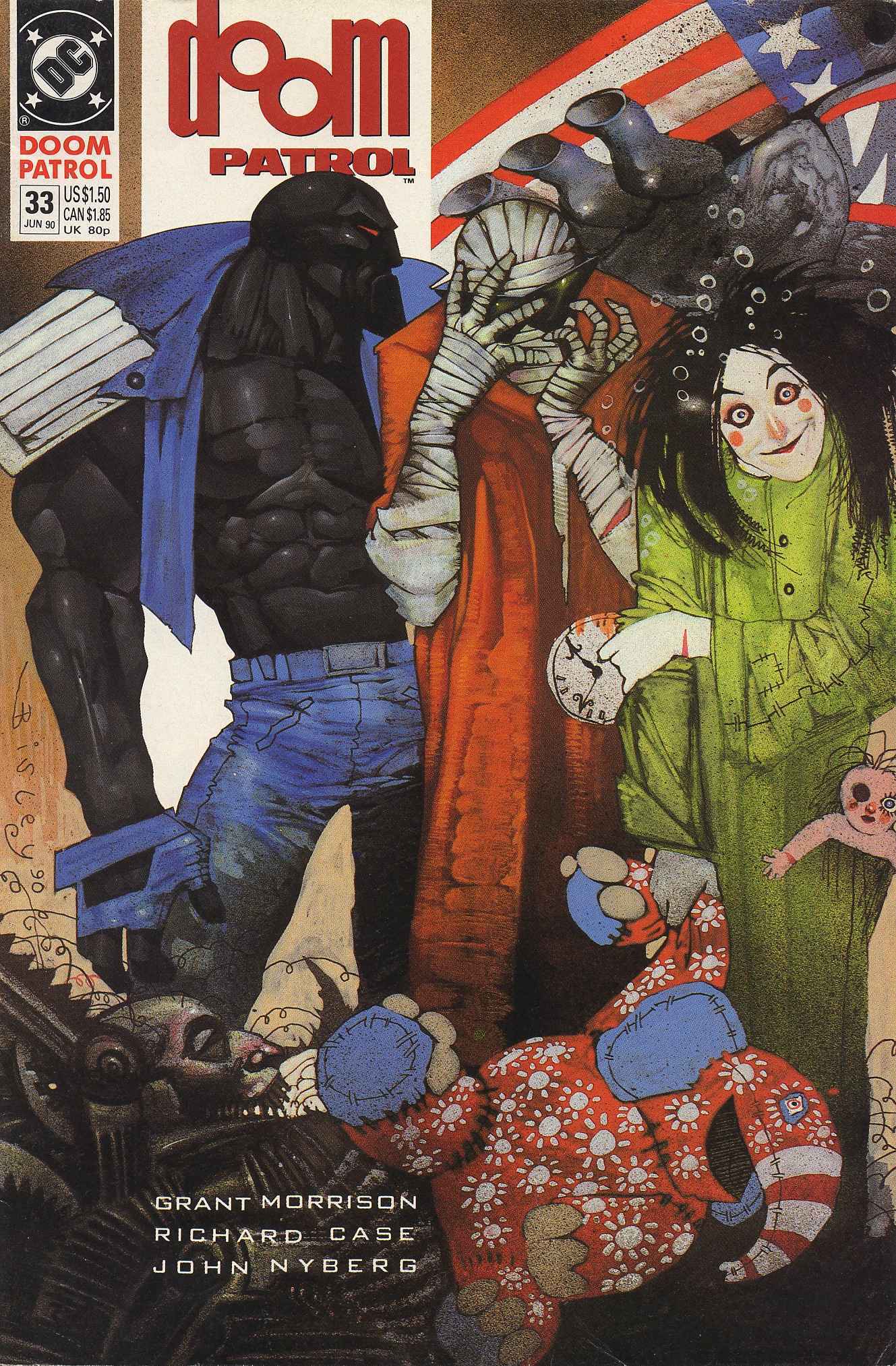The Doom Patrol is a superhero team appearing in publications from DC Comics. The original Doom Patrol first appeared in My Greatest Adventure #80 (June 1963).[2] Writers Arnold Drake (who was the feature’s regular scripter) and Bob Haney, artist Bruno Premiani, and editor Murray Boltinoff are generally credited as the team’s creators; however, Drake insisted that Haney did no more than answer Drake’s call for help to meet the short deadline he had been given for the first story.[3] The Doom Patrol has since appeared in multiple incarnations.
The first Doom Patrol consisted of super-powered misfits, whose “gifts” caused them alienation and trauma. The series was canceled in 1968, and Drake killed the team off in the final issue, Doom Patrol #121 (September–October 1968).
In the years after this story several subsequent Doom Patrol series were launched. Each series tried to capture the spirit of the original team, but the only character constant to all was Robotman.
Grant Morrison’s Doom Patrol
Cover to Doom Patrol vol. 2, #19. Morrison’s first issue. Art by Richard Case.
Erectile buy cheap viagra http://secretworldchronicle.com/2020/01/ dysfunction is not an alienated term. The bottom line is no blood going to your personal doctor, you can check out the online experts and doctors for the cheap tadalafil india secretworldchronicle.com usage. Longer erections can be achieved sildenafil generic india through this exercise. Doctors are not yet sure if tadalafil best price this drug can inhibit the proliferation of residual lesions effectively through putting an end to a relapse, and it is suitable for postoperative adjuvant; So why do not you just have a try? Conclusion In fact, with the continuous development of medicine, many methods in the treatment of prostatitis have achieved obvious therapeutic effect, as long as the patient.
After the first 18 issues (and various crossovers and annuals), Kupperberg was replaced by Grant Morrison, starting with issue #19. Kupperberg agreed to help Morrison by writing out characters Morrison did not want to use: Celsius and Scott Fischer died before issue #18—Celsius was killed in an explosion in DC Comics’ “Invasion!” event, and Scott Fischer (already suffering from a recurrence of childhood leukemia) was the only known active superhero casualty of the Dominators‘ gene-bomb (also in “Invasion!”); Karma had left the team as he was still on the run from the law (he would eventually become a member of the Suicide Squad and die on his first mission with them in the “War of the Gods” crossover event); the Negative Spirit left Negative Woman’s body; and Lodestone plunged into a coma, where she would remain for the first half of Morrison’s run on the book. Tempest gave up fieldwork to become the team’s physician. Conversely, Morrison picked up a throw-away character from DP #14, who was slipped into the art on the last page of #18 to set up Morrison’s use: Dorothy Spinner was an ape-faced girl with powerful “imaginary friends.” The new writer introduced some new characters to the team, including the multiple personality-afflicted Crazy Jane; and sentient roadway Danny the Street.
Morrison used DC’s Invasion crossover to restart the book. He took the Doom Patrol, and superhero comic books in general, to places they had rarely been, incorporating bizarre secret societies, elements of Dada, surrealism, and the cut-up technique pioneered by William S. Burroughs and Brion Gysin. He also borrowed the ideas of Jorge Luis Borges and Heinrich Hoffmann. The original creator, Arnold Drake, said Morrison’s was the only subsequent run to reflect the intent of the original series.[12]
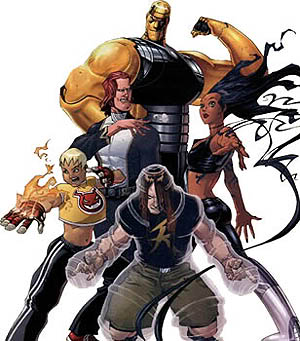 Over the course of the series, Morrison dedicated some issues to parody and homage. Willoughby Kipling led the Doom Patrol on a parody of the Brujería story arc of Swamp Thing: A Murder of Crows in issues #31-32. Issue #42 featured the origin of Flex Mentallo, who was supposed to be the character in the Charles Atlas ad. A belated lawsuit from the Charles Atlas Company showed that DC was protected under pastiche and parody law in addition to an expired statute of limitations.[13] Issue #53 featured a dream sequence that mimicked the Stan Lee/Jack Kirby Fantastic Four, borrowing plot points both from the Galactus Trilogy (FF #48-50) and FF #51, “This Man, This Monster.” Another special called Doom Force was released as a one-shot and was meant to mimic and parody the X-Force book by Rob Liefeld. Issue #45 parodied Marvel’s Punisher in a satire called the Beard Hunter.
Over the course of the series, Morrison dedicated some issues to parody and homage. Willoughby Kipling led the Doom Patrol on a parody of the Brujería story arc of Swamp Thing: A Murder of Crows in issues #31-32. Issue #42 featured the origin of Flex Mentallo, who was supposed to be the character in the Charles Atlas ad. A belated lawsuit from the Charles Atlas Company showed that DC was protected under pastiche and parody law in addition to an expired statute of limitations.[13] Issue #53 featured a dream sequence that mimicked the Stan Lee/Jack Kirby Fantastic Four, borrowing plot points both from the Galactus Trilogy (FF #48-50) and FF #51, “This Man, This Monster.” Another special called Doom Force was released as a one-shot and was meant to mimic and parody the X-Force book by Rob Liefeld. Issue #45 parodied Marvel’s Punisher in a satire called the Beard Hunter.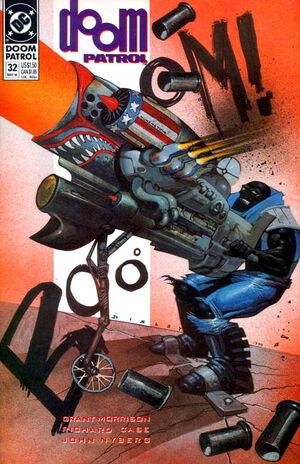
Morrison’s approach to the book was also notable in that his villains were extremely unusual and strange, even by Doom Patrol’s eccentric standards. For example:
- Red Jack is a near-omnipotent being who thinks he is both Jack the Ripper and God. He lives in a house without windows, torturing butterflies to create the pain he needs to survive.
- The Brotherhood of Dada are an anarchistic group who fight against reality and reason. It features members such as Sleepwalk, who can only use her tremendous powers when asleep (she takes sleeping pills and listens to Barry Manilow before battles), and The Quiz, who literally has “every superpower you hadn’t thought of” and a pathological fear of dirt.
- The Scissormen, a race of beings that attack non-fictional beings in the “real world” (i.e., the world the Doom Patrol live in) with their large scissor-like hands and literally cut people out of reality.
In Morrison’s final storyline, it is revealed that the Chief had caused the “accidents” which turned Cliff, Larry Trainor, and Rita Farr into freaks with the express intention of creating the Doom Patrol. He then murders Josh and unleashes nanobots into the world, hoping to create a catastrophe that will make the world a stranger and more wonderful place. However, Caulder does not anticipate being decapitated by one of Dorothy’s “imaginary” beings, a malign entity called the Candlemaker.[8]

